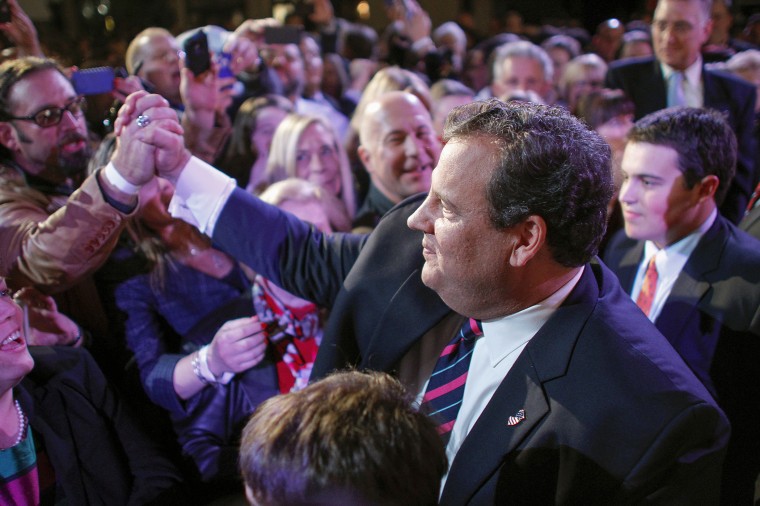Newly re-elected Gov. Chris Christie sought to distance himself from “the Washington D.C. game” on Sunday, saying his focus was strictly on working to improve the economy in his home state.
Christie appeared on four of the five major Sunday morning news shows, including “Meet the Press,” where he shrugged off moderator David Gregory’s questions about 2016. “I’m not focused on that. What I’m focused on is doing my job in the state of New Jersey. That’s what I ran for, and that’s what I want to do,” Christie said.
But on ABC’s “This Week With George Stephanopoulos,” he wouldn't commit to serving his full four-year term as goveror. “Listen, who knows,” he said. "I don't know. I'm going to continue to do my job and finish the job.”
He dodged taking a firm position on on comprehensive immigration reform, telling Fox host Chris Wallace he was in favor of “fixing the broken” immigration system while declining to address a pathway to citizenship.
Christie won 61 percent of the vote in New Jersey’s Tuesday gubernatorial elections, while his Democratic challenger state Sen. Barbara Buono received 38 percent of the vote. While Christie’s victory may have been something of a landslide, voter turnout for this election – roughly 2 million out of 5.5 million eligible voters – was the lowest since at least 1920.
And when asked if he was a moderate or conservative (something he’s been asked and has addressed rather recently), Christie responded by saying “I don’t get into these labels. That’s the Washington D.C. game. Look at my record… judge me by my record.”
On election night, Christie won big among traditionally Democratic-voting demographics; he won more than 50% of New Jersey’s women and Hispanics voters and roundly defeated state Sen. Barbara Buono by more than 20 points. His name has been in the presidential mix since 2012, and he was considered by the Romney campaign as a possible running mate. His high-profile and big win Tuesday weren't enough to keep him from losing to Hillary Clinton in an Election Day poll's hypothetical matchup; Christie's blue-state crossover appeal faded enough for Clinton to beat him 48% to 44%.
As Christie tries to go wide via the airwaves, his likely opponents have descended upon Iowa. For potential candidates with limited national appeal like Texas Sen. Ted Cruz, the socially conservative caucus voters of that state are a must-win group, one that Christie could have trouble with. But, as University of Iowa political science associate professor Timothy Hagle said, Romney made a surprising second-place showing thanks to bitter fights among far-right candidates.
In his acceptance speech Tuesday night, Christie all but announced his candidacy for president, when he called his victory an example of all kinds of people “coming together,” one that offered a lesson. "If we can do this in Trenton, New Jersey, maybe the folks in Washington, D.C. should tune in their TVs right now," he said. Whether he can manage to woo the far-right fringe that turns out for primaries without scaring off the voters he’ll need down the line is something he has yet to address.
While Christie’s biggest claim to the mantle of bipartisanship is his public embrace of President Obama in the aftermath of Hurricane Sandy, his record prior to 2012 is deeply conservative. As Salon’s Alex Seitz-Wald put it Saturday on MSNBC's UP with Steve Kornacki, “Christie is a conservative at heart on unions, on climate change, on gay rights, on pretty much everything. It’s become a mantle that’s been put on him that doesn’t really accurately describe who he is.”
The positions that look most like a shift toward the center are the same ones that would guarantee a hot primary season, but for the time being, the governor best known for loving Bruce Springsteen and yelling at schoolteachers can use them to present an alternative to the members of his party that shut down the government and continue to fight against Obamacare. He declined to challenge a court ruling that legalzied gay marriage in New Jersey, although he opposed marriage equality for years before that. He has also taken a less hostile stance to immigration reform and played down his anti-abortion views as his profile has risen.
The other side of Chris Christie is far more in line with governors like Wisconsin's Scott Walker and Michigan's Rick Snyder. Christie also stripped public sector union employees of their right to collectively bargain, and he increased their contributions to pension and health care plans.
It is too soon to know whether those stances and the tone he has struck when discussing his path to victory, one that admonished his party to not "just show up in the places where we’re comfortable." To win, he said, "we show up in the places we’re uncomfortable.” That's what MSNBC host Steve Kornacki pointed to as one that makes it impossible to ignore him as the first serious Republican presidential contender, the skill that allows him to "talk to a room full of people who disagree with him and win them over," a skill he'll put to use a lot in the coming months.
With additional reporting from Drew Katchen
